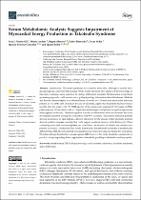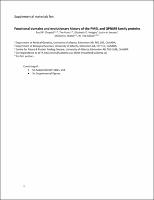| dc.contributor | Vall d'Hebron Barcelona Hospital Campus |
| dc.contributor.author | Andres Villarreal, Mireia |
| dc.contributor.author | Benito Villabriga, Begoña |
| dc.contributor.author | Bernardo, Esther |
| dc.contributor.author | Vedia, Oscar |
| dc.contributor.author | Ferreira González, Ignacio |
| dc.contributor.author | Barba Vert, Ignasi |
| dc.contributor.author | Nuñez Gil, Ivan Javier |
| dc.date.accessioned | 2022-04-08T12:01:08Z |
| dc.date.available | 2022-04-08T12:01:08Z |
| dc.date.issued | 2021-07 |
| dc.identifier.citation | Nuñez-Gil IJ, Andrés M, Benito B, Bernardo E, Vedia O, Ferreira-Gonzalez I, et al. Serum metabolomic analysis suggests impairment of myocardial energy production in takotsubo syndrome. Metabolites. 2021 Jul;11:439. |
| dc.identifier.issn | 2218-1989 |
| dc.identifier.uri | https://hdl.handle.net/11351/7333 |
| dc.description | Acute coronary syndromes; Takotsubo syndrome |
| dc.description.abstract | Introduction: Takotsubo syndrome is a complex entity that, although it usually has a good prognosis, can be life threatening. While recent advances have improved the knowledge of takotsubo syndrome, many aspects of its etiology still remain uncertain. Metabolomics, a hypothesis generating approach, could provide novel pathophysiology information about this disease. Methods and Results: Serum samples were obtained from takotsubo (n = 19) and acute myocardial infarction patients (n = 8) at the cath lab and, in the case of takotsubo, again once the patient had recovered, 3 months after the main event. 1H NMR spectra of the serum were acquired at 9.4T using a CPMG pulse sequence (32 ms effective delay). Supervised and unsupervised pattern recognition approaches where applied to the data. Pattern recognition was able to differentiate between takotsubo and acute myocardial infarction during the acute phase with 95% accuracy. Myocardial infarction patients showed an increase in lipid signals, a known risk factor for the disease while takotsubo patients showed a relative increase in acetate that could suggest a reduced turnover of the Krebs cycle. When comparing acute and recovered phases, we could detect an increase in alanine and creatine once patients recovered. Conclusions: Our results demonstrate that takotsubo syndrome is metabolically different than AMI, showing limited myocardial energy production capacity during the acute phase. We achieved high classification success against AMI; however, this study should be considered as a proof of concept regarding clinical application of metabolic profiling in takotsubo cardiomyopathy. |
| dc.language.iso | eng |
| dc.publisher | MDPI |
| dc.relation.ispartofseries | Metabolites;11(7) |
| dc.rights | Attribution 4.0 International |
| dc.rights.uri | http://creativecommons.org/licenses/by/4.0/ |
| dc.source | Scientia |
| dc.subject | Miocardi - Malalties - Fisiologia patològica |
| dc.subject | Metabolòmica |
| dc.subject.mesh | Takotsubo Cardiomyopathy |
| dc.subject.mesh | /physiopathology |
| dc.subject.mesh | Metabolomics |
| dc.title | Serum Metabolomic Analysis Suggests Impairment of Myocardial Energy Production in Takotsubo Syndrome |
| dc.type | info:eu-repo/semantics/article |
| dc.identifier.doi | 10.3390/metabo11070439 |
| dc.subject.decs | miocardiopatía de Takotsubo |
| dc.subject.decs | /fisiopatología |
| dc.subject.decs | metabolómica |
| dc.relation.publishversion | https://doi.org/10.3390/metabo11070439 |
| dc.type.version | info:eu-repo/semantics/publishedVersion |
| dc.audience | Professionals |
| dc.contributor.organismes | Institut Català de la Salut |
| dc.contributor.authoraffiliation | [Nuñez-Gil IJ, Bernardo E, Vedia O] Interventional Cardiology Unit, Cardiovascular Institute, Hospital Clínico San Carlos, 28040 Madrid, Spain. [Andrés M] Grup de Recerca en Malalties Cardiovasculars, Servei de Cardiologia, Vall d’Hebron Institut de Recerca (VHIR), Barcelona, Spain. Vall d’Hebron Hospital Universitari, Barcelona, Spain. [Benito B, Ferreira-Gonzalez I] Grup de Recerca en Malalties Cardiovasculars, Servei de Cardiologia, Vall d’Hebron Institut de Recerca (VHIR), Barcelona, Spain. Vall d’Hebron Hospital Universitari, Barcelona, Spain. Centro de Investigación Biomédica en Red (CIBER) de Enfermedades Cardiovasculares (CIBERCV), Instituto de Salud Carlos III, 28029 Madrid, Spain. [Barba I] Grup de Recerca en Malalties Cardiovasculars, Servei de Cardiologia, Vall d’Hebron Institut de Recerca (VHIR), Barcelona, Spain. Vall d’Hebron Hospital Universitari, Barcelona, Spain. Faculty of Medicine, University of Vic-Central University of Catalonia (UVicUCC), Can Baumann, 08500 Vic, Spain. Vall d’Hebron Institute of Oncology (VHIO), Barcelona, Spain |
| dc.identifier.pmid | 34357333 |
| dc.identifier.wos | 000676632300001 |
| dc.relation.projectid | info:eu-repo/grantAgreement/ES/PE2013-2016/PI14%2F01431 |
| dc.relation.projectid | info:eu-repo/grantAgreement/ES/PE2013-2016/PI17%2F01397 |
| dc.rights.accessrights | info:eu-repo/semantics/openAccess |


